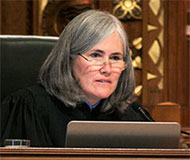5/29/2020
Ohio Appeals Court Upholds Photo Ticket For Violating Implicit Speed LimitAppellate court rules that Toledo, Ohio speed cameras can issue tickets for violation of implicit speed limits.

Toledo's speed camera ordinance does not have to spell out the speed limits on the roads where automated ticketing is used, the Ohio Court of Appeals ruled last week. A three-judge panel took up the issue after motorist Jeffrey D. Reusch had his 2017 Honda SUV photographed on Interstate 75 on October 14, 2018. On that day, Toledo police Officer Scott Swartz set up an automated laser speed camera trap that accused Reusch of traveling 62 MPH in a spot where the usual 60 MPH speed limit had been lowered to 50 MPH.
Reusch, an attorney, decided to challenge the ticket on the grounds that Toledo's own city code does not allow photo enforcement of a lowered interstate construction zone speed limit. He pointed out that the speed camera code only covers a specific subset of alleged violations.
"The owner of a vehicle... shall be liable for a penalty imposed pursuant to this section if such vehicle is operated at a speed in excess of those set forth in Toledo Municipal Code Section 333.03," Toledo's speed camera ordinance states.
Section 333.03 does not include any reference to construction zone speed limits. Instead, it sets forth 60 MPH as the speed limit for Interstate 75.
"The issue is not whether the 50 MPH speed limit was legally declared by the director of transportation," Reusch argued. "Instead, the relevant issue is whether the element of the 50 MPH speed limit being set forth in Toledo Municipal Code 333.03 is satisfied.... As drafted by the city of Toledo, [the speed camera ordinance] does not say that it is a violation to exceed the posted speed limit. Nor does it say that it is a violation to exceed the speed limit established by the director of transportation."
The city council could have held a public meeting and amended the ordinance in question setting out the lowered speed limit, but it did not do so, Reusch pointed out. The three-judge appellate panel saw no reason for the city to change its ordinance.
"Toledo Municipal Code 333.03 includes two provisions that set forth express speed limits -- (b) and (d) -- and five provisions that set forth implicit speed limits," Judge Mary Eileen Kilbane wrote for the panel. "'Set forth' is not limited to express speed limits; if that were true, then the limits imposed by the other provisions would be meaningless. That cannot be the case. The trial court found that TMC 333.03(h) set forth an implicit speed limit that Reusch violated, therefore making him liable. We agree."
Reusch now must appeal the ruling or pay $120 to Redflex Traffic Systems, the Australian company that runs the camera program. A copy of the ruling is available in a 150k PDF file at the source link below.


